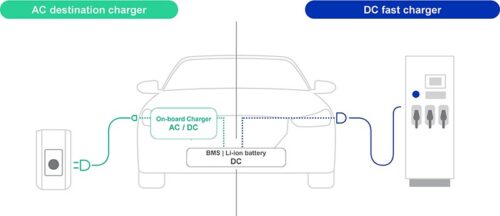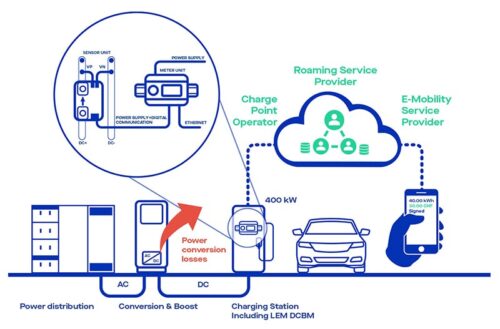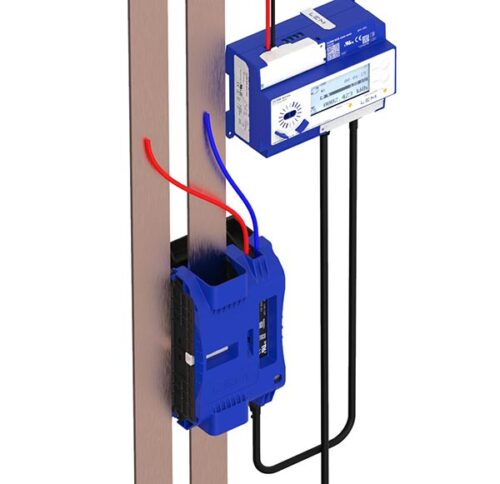 A major step forward in supporting the deployment of fast electric vehicle (EV) chargers in North America, the bi-directional DCBM will enable makers of electric vehicle charging stations (EVCSs) to accelerate their certification for DC metering requirements following Certified Test and Evaluation Professional/National Type Evaluation Program (CTEP/NTEP) certification. The DCBM will simplify the process of the manufacturers having to qualify their own charging stations for UL listed certification and, for extra peace of mind, will undergo a fresh audit every quarter.
A major step forward in supporting the deployment of fast electric vehicle (EV) chargers in North America, the bi-directional DCBM will enable makers of electric vehicle charging stations (EVCSs) to accelerate their certification for DC metering requirements following Certified Test and Evaluation Professional/National Type Evaluation Program (CTEP/NTEP) certification. The DCBM will simplify the process of the manufacturers having to qualify their own charging stations for UL listed certification and, for extra peace of mind, will undergo a fresh audit every quarter.
Capable of monitoring current, voltage, temperature and energy, the new meter has been designed with data security, e-mobility, digitization and flexibility in mind and is a UL recognized component for the United States and Canada. The DCBM 400/600 complies with the standards UL 61010 and UL 810 with its certification in the FTRZ category for EV applications. To achieve this certification, the meter had to pass reinforced insulation tests, temperature testing of all its components and sub-assemblies, testing for protection against electric chock, durability of markings tests, equipment temperature limit tests and resistance to heat/fire risk tests.
 In California, where there is a long-term transportation strategy of reducing CO2 and greenhouse gas emissions, it has been recognized that a widespread and reliable fuelling infrastructure is essential to meet the goal of increasing the usage of low-emission hybrid electric and zero-emission battery electric vehicles.
In California, where there is a long-term transportation strategy of reducing CO2 and greenhouse gas emissions, it has been recognized that a widespread and reliable fuelling infrastructure is essential to meet the goal of increasing the usage of low-emission hybrid electric and zero-emission battery electric vehicles.
To achieve this, EV users need a ‘gas station’ like experience so vehicle charging times need to be reduced to just a few minutes. Direct current fast charging (DCFC) makes this possible by converting AC into DC outside an EV, by-passing its on-board charger (OBC) and delivering up to 350kW of power directly to the vehicle’s battery pack.
However, while this method boosts charging power, the conversion stage generates power losses – costs that are not covered by the EV owner. That’s why knowing exactly how much energy has been delivered to a vehicle after AC has been converted to DC is crucial for accurate and transparent billing.
 Ideal for DCFC stations from 25kW to 400kW, the DCBM 400/600 enables costs to be managed precisely and integrates the signed billing data sets according to the Open Charge Metering Format (OCMF) protocol. The new meter doesn’t just deliver authentic billing but also secure communications and easy connectivity to Cloud services. Based on a straightforward plug & play approach for rapid and easy integration, even when retrofitting to existing charging stations, the DCBM 400/600 has a moveable measuring element for use with any type of charging station architecture.
Ideal for DCFC stations from 25kW to 400kW, the DCBM 400/600 enables costs to be managed precisely and integrates the signed billing data sets according to the Open Charge Metering Format (OCMF) protocol. The new meter doesn’t just deliver authentic billing but also secure communications and easy connectivity to Cloud services. Based on a straightforward plug & play approach for rapid and easy integration, even when retrofitting to existing charging stations, the DCBM 400/600 has a moveable measuring element for use with any type of charging station architecture.
Other features of the meter include an Ethernet communication capability, supporting the HTTP/REST protocol and Network Time Protocol (NTP) time synchronization, which again simplifies integration into many different types of EVCSs. Also, bi-directional energy metering makes it compatible with V2G (vehicle-to-grid) and V2X (vehicle-to-everything) standards. Finally, the robustly designed DCBM 400/600 is accurate in temperatures of -40°F to +185°F and has an IP20-rated casing.
Says Claude Champion, General Manager at LEM USA Inc.: “The US and Canadian markets for EVs are continually expanding but this growth could be held back by insufficient access to rapid DC charging stations. LEM understands exactly what the sector needs and has worked closely with EVCS manufacturers and installers when developing solutions like the DCBM 400/600. We are ready to help make a zero-carbon future possible for North America.”


